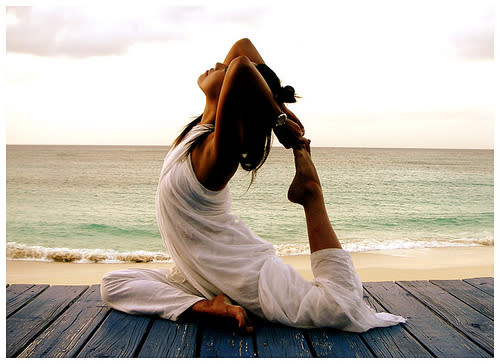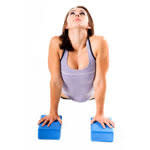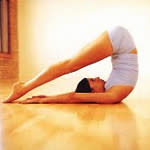Which Yoga Practice is Right for You?

It seems like yoga is everywhere these days.
There's so much of it, in fact, that it can be downright intimidating. What studio should I pick? What style should I practice? And - more importantly - where do I get cute pants?
Before you give up on the idea of ever being able to stand on your head, here are the deets on some of the most commonly practiced styles of yoga - and which one might be right for you.
Bikram
A Bikram class is broken down into 26 asanas, or poses, done in a fixed sequence, repeated twice over the course of 90 minutes. Given that it's done in a room heated to 105°F with 40 percent humidity, you will sweat your butt off. No matter where you go, the elements of Bikram will be consistent.
Pros: If you have wrist problems, it's ideal, given that chatarungas and vinyasa are not part of the 26 asanas. With all that sweating, you're also releasing toxins and keeping your muscles warm.
Cons: The heated room creates fake body heat, thus giving the sensation of a tough workout or intense sweat that didn't necessarily come from true physical exertion. Translation? Just cause you're perspiring like a man doesn't necessarily mean you're burning more calories.
It's for you if: You want a maximum sweating sensation outside of a steam room.
Iyengar
Iyengar is the style of yoga most focused on alignment and anatomical precision in the poses. Each asana is held longer than average, anywhere from 8-20 breaths, and props such as belts, walls, blocks, blankets and chairs are typically used as well.
Pros: If you are less athletic or sweat-phobic, it provides a perfect platform for trying yoga.
Cons: You need 'stuff' to do it as Iyengar intended. If you are looking for a sweat or 'moving meditation,' you could get impatient with Iyengar's static nature.
It's for you if: You don't feel like moving around a whole lot, but you want to do some toning for your muscles and spine.
Ashtanga
Until recently, Ashtanga was the commonly-known style of yoga in the West. The asanas are broken down into six fixed series, which are done in identical order every time, much like Bikram. The difference lies in the focus on breath, vinyasa (linking breath with movement) and sweat. Chatarungas (or yogi push ups) are the norm here.
Pros: It's the most athletic and cardiovascular toning form of yoga.
Cons: Given it is a set series, it can get repetitive.
It's for you if: You want a straight-up, direct, no-nonsense workout and don't feel like being surprised.
Yin
Yin yoga is the most '"relaxing" yoga in the sense of checkin' out and gettin' your zen on. It consists of simple poses - more of the stretching kind - and links them with elements of Taoism. It has a more restorative angle and will leave you feeling open, stretched, blissed out, but not very sweaty - almost like a massage without the masseus.
Pros: You can totally check out and just be on a mat, relaxing in your own world.
Cons: It's not a workout in the traditional sense, but you may feel sore the next day from the long holds.
It's for you if: You just want to stretch, calm your mind and slow down.
Kundalini
Kundalini is one of the more metaphysical styles of yoga and is based on trying to awaken the secret energy in the spine, which is believed to resemble that of a serpent. Through various meditations and movements, you will strive to awaken this energy by unlocking the chakras.
Pros: It serves as mental/spiritual work more than any other fixed style.
Cons: It can get esoteric, and if you are not ready for it, frustrating.
It's for you if: You aren't sure what you're looking for, but know you want a bit of everything until you find out.
The fun of yoga is trying different styles, depending on your mood or your fitness goals. Check out different studios and instructors 'til you find one that jives with your style. It's like love - when it's right, you'll know.
What style of yoga do you practice? Leave us your feedback at healthybitchdaily.com





